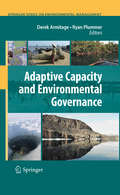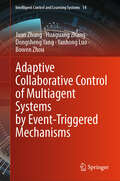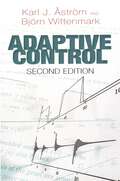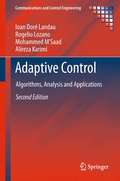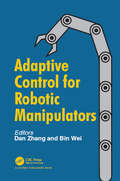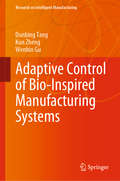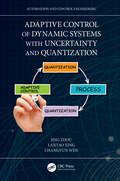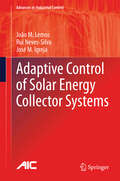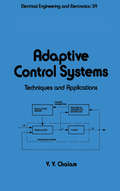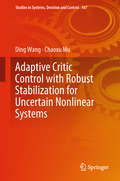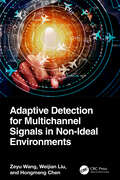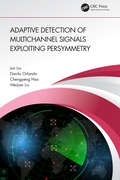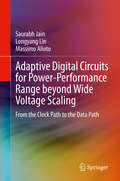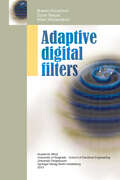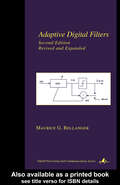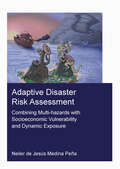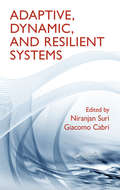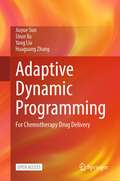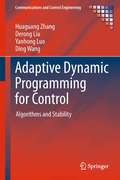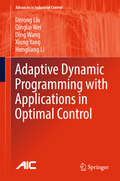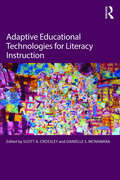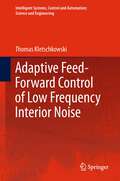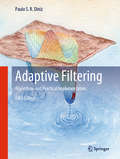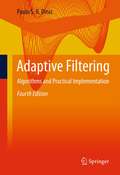- Table View
- List View
Adaptive Capacity and Environmental Governance (Springer Series on Environmental Management)
by Derek Armitage Ryan PlummerRapid environmental change calls for individuals and societies with an ability to transform our interactions with each other and the ecosystems upon which we depend. Adaptive capacity - the ability of a social-ecological system (or the components of that system) to be robust to disturbances and capable of responding to changes - is increasingly recognized as a critical attribute of multi-level environmental governance. This unique volume offers the first interdisciplinary and integrative perspective on an emerging area of applied scholarship, with contributions from internationally recognized researchers and practitioners. It demonstrates how adaptive capacity makes environmental governance possible in complex social-ecological systems. Cutting-edge theoretical developments are explored and empirical case studies offered from a wide range of geographic settings and natural resource contexts, such as water, climate, fisheries and forestry. * Of interest to researchers, policymakers and resource managers seeking to navigate and understand social-ecological change in diverse geographic settings and resource contexts
Adaptive Collaborative Control of Multiagent Systems by Event-Triggered Mechanisms (Intelligent Control and Learning Systems #14)
by Juan Zhang Huaguang Zhang Dongsheng Yang Yanhong Luo Bowen ZhouThis book provides a detailed study of several types of control problems in multi-agent systems, including consensus, output regulation, containment, and formation problems. The research on collaborative control of multi-agent systems has attracted engineers and scientists from various disciplines such as control, mathematics, artificial intelligence, and computer engineering. This book proposes a control strategy based on adaptive triggering mechanism and establishes a basic energy-saving framework; it also proposes an adaptive learning rate to replace fixed weights, ensuring that the proposed strategy does not rely on any global information of the communication topology and has scalability. This book is ideal for students, researchers, and engineers in collaborative control, wireless networks, power grids, UAVs, and more.
Adaptive Compensation of Nonlinear Actuators for Flight Control Applications (Studies in Systems, Decision and Control #386)
by Dipankar Deb Gang Tao Jason BurkholderThis book provides a basic understanding of adaptive control and its applications in Flight control. It discusses the designing of an adaptive feedback control system and analyzes this for flight control of linear and nonlinear aircraft models using synthetic jet actuators. It also discusses control methodologies and the application of control techniques which will help practicing flight control and active flow control researchers. It also covers modelling and control designs which will also benefit researchers from the background of fluid mechanics and health management of actuation systems.The unique feature of this book is characterization of synthetic jet actuator nonlinearities over a wide range of angles of attack, an adaptive compensation scheme for such nonlinearities, and a systematic framework for feedback control of aircraft dynamics with synthetic jet actuators.
Adaptive Control: Second Edition (Dover Books on Electrical Engineering)
by Karl J. Åström Björn WittenmarkSuitable for advanced undergraduates and graduate students, this text introduces theoretical and practical aspects of adaptive control. It offers an excellent perspective on techniques as well as an active knowledge of key approaches. Readers will acquire a well-developed sense of when to use adaptive techniques and when other methods are more appropriate.Starting with a broad overview, the text explores real-time estimation, self-tuning regulators and model-reference adaptive systems, stochastic adaptive control, and automatic tuning of regulators. Additional topics include gain scheduling, robust high-gain control and self-oscillating controllers, and suggestions for implementing adaptive controllers. Concluding chapters feature a summary of applications and a brief review of additional areas closely related to adaptive control.Both authors are Professors at the Lund Institute of Technology in Sweden, and this text has evolved from their many years of research and teaching. Their insights into properties, design procedures, and implementation of adaptive controllers are complemented by the numerous examples, simulations, and problems that appear throughout the book.
Adaptive Control: Algorithms, Analysis and Applications (Communications and Control Engineering)
by Mohammed M'Saad Rogelio Lozano Ioan Doré Landau Alireza KarimiAdaptive Control (second edition) shows how a desired level of system performance can be maintained automatically and in real time, even when process or disturbance parameters are unknown and variable. It is a coherent exposition of the many aspects of this field, setting out the problems to be addressed and moving on to solutions, their practical significance and their application. Discrete-time aspects of adaptive control are emphasized to reflect the importance of digital computers in the application of the ideas presented. The second edition is thoroughly revised to throw light on recent developments in theory and applications with new chapters on: multimodel adaptive control with switching, direct and indirect adaptive regulation and adaptive feedforward disturbance compensation. Many algorithms are newly presented in MATLAB® m-file format to facilitate their employment in real systems. Classroom-tested slides for instructors to use in teaching this material are also now provided. All of this supplementary electronic material can be downloaded from fill in URL. The core material is also up-dated and re-edited to keep its perspective in line with modern ideas and more closely to associate algorithms with their applications giving the reader a solid grounding in: synthesis and analysis of parameter adaptation algorithms, recursive plant model identification in open and closed loop, robust digital control for adaptive control; * robust parameter adaptation algorithms, practical considerations and applications, including flexible transmission systems, active vibration control and broadband disturbance rejection and a supplementary introduction on hot dip galvanizing and a phosphate drying furnace. Control researchers and applied mathematicians will find Adaptive Control of significant and enduring interest and its use of example and application will appeal to practitioners working with unknown- and variable-parameter plant. Praise for the first edition: ...well written, interesting and easy to follow, so that it constitutes a valuable addition to the monographies in adaptive control for discrete-time linear systems... suitable (at least in part) for use in graduate courses in adaptive control.
Adaptive Control for Robotic Manipulators
by Dan Zhang Bin WeiThe robotic mechanism and its controller make a complete system. As the robotic mechanism is reconfigured, the control system has to be adapted accordingly. The need for the reconfiguration usually arises from the changing functional requirements. This book will focus on the adaptive control of robotic manipulators to address the changed conditions. The aim of the book is to summarise and introduce the state-of-the-art technologies in the field of adaptive control of robotic manipulators in order to improve the methodologies on the adaptive control of robotic manipulators. Advances made in the past decades are described in the book, including adaptive control theories and design, and application of adaptive control to robotic manipulators.
Adaptive Control of Bio-Inspired Manufacturing Systems (Research on Intelligent Manufacturing)
by Dunbing Tang Kun Zheng Wenbin GuThis book introduces state-of-the-art models and methods based on the neuroendocrine-immune-inspired approaches in the field of manufacturing control systems. It develops various bio-inspired intelligent approaches for multiple applications in order to efficiently generate production plans and control solutions and agilely deal with the frequent unexpected disturbances at the shop floor level. It also provides an introduction to bio-inspired manufacturing systems with intelligent control structures and the latest technologies. Further, the book describes recent advances in the bio-inspired methodology for a high-level adaptability in manufacturing systems, including the bio-inspired control architecture and the implementation of intelligent and adaptive control approaches based on neuroendocrine-immune mechanisms and hormone-regulation principles. It offers a valuable resource for graduate students, researchers and engineers in the fields of production management, manufacturing system control and related areas.
Adaptive Control of Dynamic Systems with Uncertainty and Quantization (Automation and Control Engineering)
by Jing Zhou Lantao Xing Changyun WenThis book presents a series of innovative technologies and research results on adaptive control of dynamic systems with quantization, uncertainty, and nonlinearity, including the theoretical success and practical development such as the approaches for stability analysis, the compensation of quantization, the treatment of subsystem interactions, and the improvement of system tracking and transient performance. Novel solutions by adopting backstepping design tools to a number of hotspots and challenging problems in the area of adaptive control are provided. In the first three chapters, the general design procedures and stability analysis of backstepping controllers and the basic descriptions and properties of quantizers are introduced as preliminary knowledge for this book. In the remainder of this book, adaptive control schemes are introduced to compensate for the effects of input quantization, state quantization, both input and state/output quantization for uncertain nonlinear systems and are applied to helicopter systems and DC Microgrid. Discussion remarks are provided in each chapter highlighting new approaches and contributions to emphasize the novelty of the presented design and analysis methods. Simulation results are also given in each chapter to show the effectiveness of these methods. This book is helpful to learn and understand the fundamental backstepping schemes for state feedback control and output feedback control. It can be used as a reference book or a textbook on adaptive quantized control for students with some background in feedback control systems. Researchers, graduate students, and engineers in the fields of control, information, and communication, electrical engineering, mechanical engineering, computer science, and others will benefit from this book.
Adaptive Control of Solar Energy Collector Systems (Advances in Industrial Control)
by Rui Neves-Silva João M. Lemos José M. IgrejaThis book describes methods for adaptive control of distributed-collector solar fields: plants that collect solar energy and deliver it in thermal form. Controller design methods are presented that can overcome difficulties found in these type of plants: they are distributed-parameter systems, i. e. , systems with dynamics that depend on space as well as time; their dynamics is nonlinear, with a bilinear structure; there is a significant level of uncertainty in plant knowledge. Adaptive methods form the focus of the text because of the degree of uncertainty in the knowledge of plant dynamics. Parts of the text are devoted to design methods that assume only a very limited knowledge about the plant. Other parts detail methods that rely on knowledge of the dominant plant structure. These methods are more plant specific, but allow the improvement of performance. Adaptive Control of Solar Energy Collector Systems demonstrates the dynamics of solar fields to be rich enough to present a challenge to the control designer while, at the same time, simple enough to allow analytic work to be done, providing case studies on dynamics and nonlinear control design in a simple and revealing, but nontrivial way. The control approaches treated in this monograph can be generalized to apply to other plants modelled by hyperbolic partial differential equations, especially process plants in which transport phenomena occur, plants like dryers, steam super-heaters and even highway traffic. An important example, used repeatedly throughout the text, is a distributed-collector solar field installed at Plataforma Solar de Almeria, located in southern Spain. The control algorithms laid out in the text are illustrated with experimental results generated from this plant. Although the primary focus of this monograph is solar energy collector, the range of other systems which can benefit from the methods described will make it of interest to control engineers working in many industries as well as to academic control researchers interested in adaptive control and its applications.
Adaptive Control Systems: Techniques and Applications (Electrical And Computer Engineering Ser. #39)
by Chalamimpossible to access. It has been widely scattered in papers, reports, and proceedings ofsymposia, with different authors employing different symbols and terms. But now thereis a book that covers all aspects of this dynamic topic in a systematic manner.Featuring consistent terminology and compatible notation, and emphasizing unifiedstrategies, Adaptive Control Systems provides a comprehensive, integrated accountof basic concepts, analytical tools, algorithms, and a wide variety of application trendsand techniques.Adaptive Control Systems deals not only with the two principal approachesmodelreference adaptive control and self-tuning regulators-but also considers otheradaptive strategies involving variable structure systems, reduced order schemes, predictivecontrol, fuzzy logic, and more. In addition, it highlights a large number of practical applicationsin a range of fields from electrical to biomedical and aerospace engineering ...and includes coverage of industrial robots.The book identifies current trends in the development of adaptive control systems ...delineates areas for further research . : . and provides an invaluable bibliography of over1,200 references to the literature.The first authoritative reference in this important area of work, Adaptive ControlSystems is an essential information source for electrical and electronics, R&D,chemical, mechanical, aerospace, biomedical, metallurgical, marine, transportation, andpower plant engineers. It is also useful as a text in professional society seminars and inhousetraining programs for personnel involved with the control of complex systems, andfor graduate students engaged in the study of adaptive control systems.
Adaptive Critic Control with Robust Stabilization for Uncertain Nonlinear Systems (Studies in Systems, Decision and Control #167)
by Ding Wang Chaoxu MuThis book reports on the latest advances in adaptive critic control with robust stabilization for uncertain nonlinear systems. Covering the core theory, novel methods, and a number of typical industrial applications related to the robust adaptive critic control field, it develops a comprehensive framework of robust adaptive strategies, including theoretical analysis, algorithm design, simulation verification, and experimental results. As such, it is of interest to university researchers, graduate students, and engineers in the fields of automation, computer science, and electrical engineering wishing to learn about the fundamental principles, methods, algorithms, and applications in the field of robust adaptive critic control. In addition, it promotes the development of robust adaptive critic control approaches, and the construction of higher-level intelligent systems.
Adaptive Detection for Multichannel Signals in Non-Ideal Environments
by Weijian Liu Zeyu Wang Hongmeng ChenThis book systematically presents adaptive multichannel signal detection in three types of non-ideal environments, including sample-starved scenarios, signal mismatch scenarios, and noise plus subspace interference environments.The authors provide definitions of key concepts, detailed derivations of adaptive multichannel signal detectors, and specific examples for each non-ideal environment. In addition, the possible future trend of adaptive detection methods is discussed, as well as two further research points – namely, the adaptive detection algorithms based on information geometry, and the hybrid approaches that combine adaptive detection algorithms with machine learning algorithms.The book will be of interest to researchers, advanced undergraduates, and graduate students in sonar, radar signal processing, and communications engineering.
Adaptive Detection of Multichannel Signals Exploiting Persymmetry
by Jun Liu Danilo Orlando Chengpeng Hao Weijian LiuThis book offers a systematic presentation of persymmetric adaptive detection, including detector derivations and the definition of key concepts, followed by detailed discussion relating to theoretical underpinnings, design methodology, design considerations, and techniques enabling its practical implementation. The received data for modern radar systems are usually multichannel, namely, vector-valued, or even matrix-valued. Multichannel signal detection in Gaussian backgrounds is a fundamental problem for radar applications. With an overarching focus on persymmetric adaptive detectors, this book presents the mathematical models and design principles necessary for analyzing the behavior of each kind of persymmetric adaptive detector. Building upon that, it also introduces new design approaches and techniques that will guide engineering students as well as radar engineers toward efficient detector solutions, especially in challenging sample-starved environments where training data are limited. This book will be of interest to students, scholars, and engineers in the field of signal processing. It will be especially useful for those who have a solid background in statistical signal processing, multivariate statistical analysis, matrix theory, and mathematical analysis.
Adaptive Digital Circuits for Power-Performance Range beyond Wide Voltage Scaling: From the Clock Path to the Data Path
by Massimo Alioto Saurabh Jain Longyang LinThis book offers the first comprehensive coverage of digital design techniques to expand the power-performance tradeoff well beyond that allowed by conventional wide voltage scaling. Compared to conventional fixed designs, the approach described in this book makes digital circuits more versatile and adaptive, allowing simultaneous optimization at both ends of the power-performance spectrum. Drop-in solutions for fully automated and low-effort design based on commercial CAD tools are discussed extensively for processors, accelerators and on-chip memories, and are applicable to prominent applications (e.g., IoT, AI, wearables, biomedical). Through the higher power-performance versatility techniques described in this book, readers are enabled to reduce the design effort through reuse of the same digital design instance, across a wide range of applications. All concepts the authors discuss are demonstrated by dedicated testchip designs and experimental results. To make the results immediately usable by the reader, all the scripts necessary to create automated design flows based on commercial tools are provided and explained.
Adaptive Digital Filters
by Zoran Banjac Milan Milosavljević Branko Kovačević"Adaptive Digital Filters" presents an important discipline applied to the domain of speech processing. The book first makes the reader acquainted with the basic terms of filtering and adaptive filtering, before introducing the field of advanced modern algorithms, some of which are contributed by the authors themselves. Working in the field of adaptive signal processing requires the use of complex mathematical tools. The book offers a detailed presentation of the mathematical models that is clear and consistent, an approach that allows everyone with a college level of mathematics knowledge to successfully follow the mathematical derivations and descriptions of algorithms. The algorithms are presented in flow charts, which facilitates their practical implementation. The book presents many experimental results and treats the aspects of practical application of adaptive filtering in real systems, making it a valuable resource for both undergraduate and graduate students, and for all others interested in mastering this important field.
Adaptive Digital Filters (Signal Processing and Communications)
by Maurice BellangerThis text emphasizes the intricate relationship between adaptive filtering and signal analysis - highlighting stochastic processes, signal representations and properties, analytical tools, and implementation methods. This second edition includes new chapters on adaptive techniques in communications and rotation-based algorithms. It provides practical applications in information, estimation, and circuit theories.
Adaptive Disaster Risk Assessment: Combining Multi-Hazards with Socioeconomic Vulnerability and Dynamic Exposure (IHE Delft PhD Thesis Series)
by Neiler Medina PenaClimate change, combined with the rapid and often unplanned urbanisation trends, is associated with a rising trend in the frequency and severity of disasters triggered by natural hazards. In order to face the impacts of such threats, it is necessary to have an appropriate Disaster Risk Assessment (DRA). Traditional DRA approaches for disaster risk reduction (DRR) have focused mainly on the hazard component of risk, with little attention to the vulnerability and the exposure components. To address this issue, this dissertation’s main objective is to develop and test a disaster risk modelling framework that incorporates socioeconomic vulnerability and the adaptive nature of exposure associated with human behaviour in extreme hydro-meteorological events in the context of SIDS. To achieve the objective, an Adaptive Disaster Risk Assessment (ADRA) framework is proposed. ADRA uses an index-based approach (PeVI) to assess the socioeconomic vulnerability using three components: susceptibility, lack of coping capacities, and lack of adaptation. Furthermore, ADRA explicitly incorporates the exposure component using two approaches; first, a logistic regression model was built using the actual evacuation rates observed during Hurricane Irma, and second, an Agent-based model is used to simulate how households change their exposure levels in relation to different sources of information
Adaptive, Dynamic, and Resilient Systems
by Niranjan Suri Giacomo CabriAs the complexity of today's networked computer systems grows, they become increasingly difficult to understand, predict, and control. Addressing these challenges requires new approaches to building these systems. Adaptive, Dynamic, and Resilient Systems supplies readers with various perspectives of the critical infrastructure that systems of netwo
Adaptive Dynamic Programming: For Chemotherapy Drug Delivery
by Jiayue Sun Shun Xu Yang Liu Huaguang ZhangThis open access book focuses on the practical application of Adaptive Dynamic Programming (ADP) in chemotherapy drug delivery, taking into account clinical variables and real-time data. ADP's ability to adapt to changing conditions and make optimal decisions in complex and uncertain situations makes it a valuable tool in addressing pressing challenges in healthcare and other fields. As optimization technology evolves, we can expect to see even more sophisticated and powerful solutions emerge.
Adaptive Dynamic Programming for Control: Algorithms and Stability (Communications and Control Engineering)
by Yanhong Luo Huaguang Zhang Ding Wang Derong LiuThere are many methods of stable controller design for nonlinear systems. In seeking to go beyond the minimum requirement of stability, Adaptive Dynamic Programming in Discrete Time approaches the challenging topic of optimal control for nonlinear systems using the tools of adaptive dynamic programming (ADP). The range of systems treated is extensive; affine, switched, singularly perturbed and time-delay nonlinear systems are discussed as are the uses of neural networks and techniques of value and policy iteration. The text features three main aspects of ADP in which the methods proposed for stabilization and for tracking and games benefit from the incorporation of optimal control methods: * infinite-horizon control for which the difficulty of solving partial differential Hamilton-Jacobi-Bellman equations directly is overcome, and proof provided that the iterative value function updating sequence converges to the infimum of all the value functions obtained by admissible control law sequences; * finite-horizon control, implemented in discrete-time nonlinear systems showing the reader how to obtain suboptimal control solutions within a fixed number of control steps and with results more easily applied in real systems than those usually gained from infinite-horizon control; * nonlinear games for which a pair of mixed optimal policies are derived for solving games both when the saddle point does not exist, and, when it does, avoiding the existence conditions of the saddle point. Non-zero-sum games are studied in the context of a single network scheme in which policies are obtained guaranteeing system stability and minimizing the individual performance function yielding a Nash equilibrium. In order to make the coverage suitable for the student as well as for the expert reader, Adaptive Dynamic Programming in Discrete Time: * establishes the fundamental theory involved clearly with each chapter devoted to a clearly identifiable control paradigm; * demonstrates convergence proofs of the ADP algorithms to deepen understanding of the derivation of stability and convergence with the iterative computational methods used; and * shows how ADP methods can be put to use both in simulation and in real applications. This text will be of considerable interest to researchers interested in optimal control and its applications in operations research, applied mathematics computational intelligence and engineering. Graduate students working in control and operations research will also find the ideas presented here to be a source of powerful methods for furthering their study.
Adaptive Dynamic Programming with Applications in Optimal Control (Advances in Industrial Control)
by Ding Wang Derong Liu Qinglai Wei Xiong Yang Hongliang LiThis book covers the most recent developments in adaptive dynamic programming (ADP). The text begins with a thorough background review of ADP making sure that readers are sufficiently familiar with the fundamentals. In the core of the book, the authors address first discrete- and then continuous-time systems. Coverage of discrete-time systems starts with a more general form of value iteration to demonstrate its convergence, optimality, and stability with complete and thorough theoretical analysis. A more realistic form of value iteration is studied where value function approximations are assumed to have finite errors. Adaptive Dynamic Programming also details another avenue of the ADP approach: policy iteration. Both basic and generalized forms of policy-iteration-based ADP are studied with complete and thorough theoretical analysis in terms of convergence, optimality, stability, and error bounds. Among continuous-time systems, the control of affine and nonaffine nonlinear systems is studied using the ADP approach which is then extended to other branches of control theory including decentralized control, robust and guaranteed cost control, and game theory. In the last part of the book the real-world significance of ADP theory is presented, focusing on three application examples developed from the authors' work: * renewable energy scheduling for smart power grids; * coal gasification processes; and * water-gas shift reactions. Researchers studying intelligent control methods and practitioners looking to apply them in the chemical-process and power-supply industries will find much to interest them in this thorough treatment of an advanced approach to control.
Adaptive Educational Technologies for Literacy Instruction
by Scott A. Crossley Danielle S. McNamaraWhile current educational technologies have the potential to fundamentally enhance literacy education, many of these tools remain unknown to or unused by today’s practitioners due to a lack of access and support. Adaptive Educational Technologies for Literacy Instruction presents actionable information to educators, administrators, and researchers about available educational technologies that provide adaptive, personalized literacy instruction to students of all ages. These accessible, comprehensive chapters, written by leading researchers who have developed systems and strategies for classrooms, introduce effective technologies for reading comprehension and writing skills.
Adaptive Feed-Forward Control of Low Frequency Interior Noise (Intelligent Systems, Control and Automation: Science and Engineering #56)
by Thomas KletschkowskiThis book presents a mechatronic approach to Active Noise Control (ANC). It describes the required elements of system theory, engineering acoustics, electroacoustics and adaptive signal processing in a comprehensive, consistent and systematic manner using a unified notation. Furthermore, it includes a design methodology for ANC-systems, explains its application and describes tools to be used for ANC-system design. From the research point of view, the book presents new approaches to sound source localization in weakly damped interiors. One is based on the inverse finite element method, the other is based on a sound intensity probe with an active free field. Furthermore, a prototype of an ANC-system able to reach the physical limits of local (feed-forward) ANC is described. This is one example for applied research in ANC-system design. Other examples are given for (i) local ANC in a semi-enclosed subspace of an aircraft cargo hold and (ii) for the combination of audio entertainment with ANC.
Adaptive Filtering: Algorithms and Practical Implementation (The\springer International Series In Engineering And Computer Science Ser. #694)
by Paulo S. DinizIn the fifth edition of this textbook, author Paulo S.R. Diniz presents updated text on the basic concepts of adaptive signal processing and adaptive filtering. He first introduces the main classes of adaptive filtering algorithms in a unified framework, using clear notations that facilitate actual implementation. Algorithms are described in tables, which are detailed enough to allow the reader to verify the covered concepts. Examples address up-to-date problems drawn from actual applications. Several chapters are expanded and a new chapter ‘Kalman Filtering’ is included. The book provides a concise background on adaptive filtering, including the family of LMS, affine projection, RLS, set-membership algorithms and Kalman filters, as well as nonlinear, sub-band, blind, IIR adaptive filtering, and more. Problems are included at the end of chapters. A MATLAB package is provided so the reader can solve new problems and test algorithms. The book also offers easy access to working algorithms for practicing engineers.
Adaptive Filtering: Algorithms and Practical Implementation (The\springer International Series In Engineering And Computer Science Ser. #694)
by Paulo S. R. DinizIn the fourth edition of Adaptive Filtering: Algorithms and Practical Implementation, author Paulo S. R. Diniz presents the basic concepts of adaptive signal processing and adaptive filtering in a concise and straightforward manner. The main classes of adaptive filtering algorithms are presented in a unified framework, using clear notations that facilitate actual implementation. The main algorithms are described in tables, which are detailed enough to allow the reader to verify the covered concepts. Many examples address problems drawn from actual applications. New material to this edition includes: Analytical and simulation examples in Chapters 4, 5, 6 and 10 Appendix E, which summarizes the analysis of set-membership algorithm Updated problems and references Providing a concise background on adaptive filtering, this book covers the family of LMS, affine projection, RLS and data-selective set-membership algorithms as well as nonlinear, sub-band, blind, IIR adaptive filtering, and more. Several problems are included at the end of chapters, and some of these problems address applications. A user-friendly MATLAB package is provided where the reader can easily solve new problems and test algorithms in a quick manner. Additionally, the book provides easy access to working algorithms for practicing engineers.
